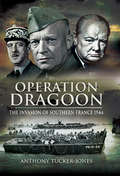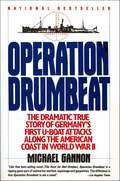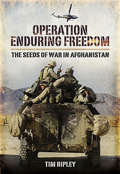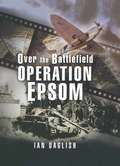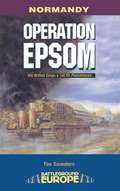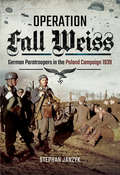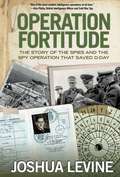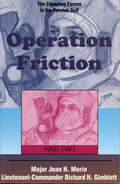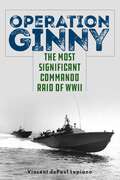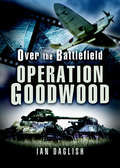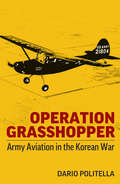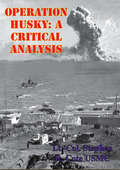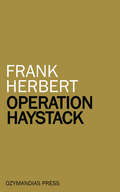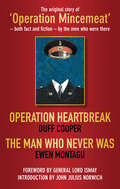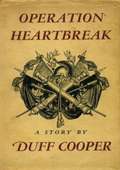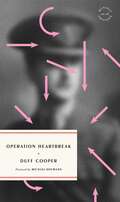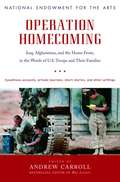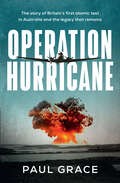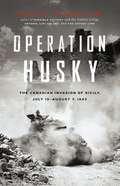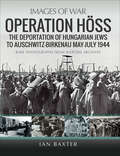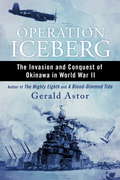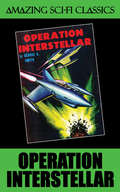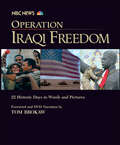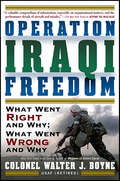- Table View
- List View
Operation Dragoon: The Liberation of Southern France, 1944
by Anthony Tucker-JonesOperation Dragoon, the Allied landings in the south of France in August 1944, is often seen as a sideshow supporting Operation Overlord, the crucial D-Day landings in Normandy. And often the operation is criticized as an expensive diversion of men and equipment from the struggle against the German armies in Italy. Yet, as Anthony Tucker-Jones shows in his new in-depth study, Dragoon and the subsequent Allied advance across southern France were key stages in the liberation of Europe, and the operation had far-reaching political and military ramifications. Controversy dogged the plan from the start. Fierce disagreement among the senior Allied commanders and politicians - in particular between Churchill, Eisenhower and de Gaulle - threatened to weaken the Anglo-American war effort.In vivid detail Anthony Tucker-Jones tells the story of the high-level strategic argument that gave birth to Dragoon, and he looks at the impact of the operation on the direction and duration of the war against Nazi Germany. He also describes the course of the invasion on the ground - the massive logistical effort required, the landings themselves, the role played by the French resistance, and the bitter battles fought against German rearguards as they sought to retain France's southern cities and cover their withdrawal toward the strategic Belfort Gap.
Operation Drumbeat: The Dramatic True Story of Germany's First U-Boat Attacks Along the American Coast in World War II
by Michael GannonA riveting account of U-boat warfare.
Operation Drumbeat: The Dramatic True Strory of Germany's Fast U-Boat Attacks Along the American Coast in World War II
by Michael GannonAn account of Germany's little known U-boat campaign against merchant shipping along the North American Atlantic coast during the first six months of 1942. It also documents the failure of the US Navy to meet the German attack.
Operation Enduring Freedom: The Seeds of War in Afghanistan
by Tim RipleyThe first six months of the war in Afghanistan were incredibly confused. Few journalists or civilians had access to the main events and the result was the creation of many urban myths that persist to this day. This book reveals the truth behind Operation Enduring Freedom, its objectives, successes, failures and consequences. Tim Ripley has discovered what actually happened in the first six months of this US-led intervention. He reveals the clandestine US and UK reconnaissance efforts before hostilities commenced on 7 October 2001, secret US UAV and drone operations, RAF Canberra and U-2 spy flights and details of initial combat between Taliban and Northern Alliance ground forces.This is a definitive account of the first six months of the military campaign in Afghanistan that saw the initial air and special drive to unseat the Taliban regime, the launching of search and destroy operations to hunt down Osama bin Ladens Al Qaeda organization and the setting up of President Hamid Karzais government in Kabul. These events were the catalyst for the subsequent and continuing war in that far-off troubled land.
Operation Epsom: Over the Battlefield (Over the Battlefield)
by Ian DaglishThis WWII tactical study brings new clarity to the First Battle of the Odon, a significant Allied offensive in the early day of Operation Overlord. A vital yet overlooked episode of the Normandy Campaign, Operation Epsom was General Montgomery&’s first attempt to capture the city of Caen in the Odon valley. The notoriously chaotic battle pitted inexperienced British divisions against some of the best equipped, best led and battle-hardened formations of the Third Reich. Though there was no decisive victor, military historian Ian Daglish shows that this battle allowed the Allied forces to retain strategic initiative through the liberation of France and Belgium. Beginning with a British assault on the German lines in dense terrain, the battle developed into swirling armored action on the open slopes of Hills 112 and 113. The British then turned to defend their gains in the face of concentric attacks by two full SS-Panzer Korps. With previously unseen evidence and expert analysis, Daglish sheds new light on this important Normandy battle. The unfolding action is illustrated using aerial photography of the battlefield and period Army maps.
Operation Epsom: VIII British Corps vs 1st SS Panzerkorps (Battleground Europe)
by Tim SaundersFollow 15th Scottish and 11th Armoured Divisions as they fight to outflank and seize the German-occupied city of Caen during WWII’s Battle of Normandy.Operation EPSOM was Montgomery’s third attempt to take the city of Caen, which was a key British D-Day objective. This book takes us through the actions in vivid detail. Delayed by a storm, the attack, designed to envelop Caen from the west, eventually began at the end of June 1944. The Territorial Army battalions of 15th Scottish Division spearheaded the attacks through the well developed positions of 12th Hitlerjugend SS Panzer Division.It was slow going and when tanks of the 11th Armoured Division dashed to the Odon Bridges, they ran into the concentrated fire of dug-in panzers. However, the following day the Argyle and Sutherland Highlanders slipped through the German defenses and seized a vital bridge. Armor poured across but, rather than pushing home their advantage, the British prepared to beat off a powerful counterattack from II SS Panzer Corps.
Operation Fall Weiss: German Paratroopers in the Poland Campaign, 1939
by Stephan JanzykWhile the fledgling German paratroop operations in Belgium and the Netherlands in 1940, and on Crete in 1941, attracted worldwide attention, what is not as well known is that the use of paratroopers was planned for the invasion of Poland in 1939, in an act that began the Second World War. This has given rise to the myth that Adolf Hitler wanted to keep this new, and hitherto little-known, branch of the armed services secret for future projects.However, on several occasions the men of Parachute Regiment 1 were sat ready in their Ju52 transport planes, fully equipped and ready to go. 'Operation Fall Weiss' describes the role of the German paratroopers in the Polish campaign, using war diaries, maps, contemporary documents and photographs, including those from various private collections around the world.
Operation Fortitude: The Story of the Spies and the Spy Operation That Saved D-Day
by Joshua LevineOperation Fortitude tells the thrilling tale of an ingenious decption that changed the course of the Second World War. The Story is one of intrigue, drama, and good fortune, practically a Hollywood script. It is the tale of double agents, fake radio transmissions and dummy invasion craft.
Operation Friction 1990-1991
by Richard H. Gimblett Jean H. MorinThis official account of the crisis in the Persian Gulf traces the Canadian Forces commitment to the Gulf region in response to Iraqi aggression in 1990-1991. Written by two officers who served in the Persian Gulf during the period of hostilities in 1991, this official account is the fruit of four years of detailed research. Based upon their personal experiences, numerous interviews, and unrestricted access to official papers, they have produced a candid account of value for both the military professional and the interested civilian. In January 1991, the Chief of Defence Staff authorized the Director of History to post Major Jean Morin as field historian to the staff of the Commander, Canadian Forces Middle East (Commodore Ken Summers). It was the first time since the Korean War that a historical officer had been posted to the staff of a Canadian commander overseas.
Operation Ginny: The Most Significant Commando Raid of WWII
by Vincent dePaul LupianoOperation Ginny is the story of the two Operation Ginnys. Both military assaults by the Allied forces were unsuccessful, although the first was successfully recalled. The second operation launched one month later, March 22, 1943, and ended up in the murder of all 15 American participants by the Nazis. It became one of the most notable and historic raids of WWII, providing much legal precedent and criteria for the Nuremberg Trials that began in September 1946. While not a military success, Operation Ginny was unlike any other commando operation during WWII and would have consequences and effects on the conduct and illegalities of war and military criminal justice. And thereby hangs a tale….
Operation Goodwood: Operation Goodwood (Over the Battlefield)
by Ian DaglishThis ground-level WWII history describes the British armored offensive into occupied France with rare wartime photos. Military historian Ian Daglish presents an authoritatively detailed chronicle of the greatest armored battle undertaken by the British during the Second World War. After the Normandy Landings, Operation Goodwood sent British tanks south out of the Orne bridgehead. Though the operation failed to break through German defenses, it exposed critical vulnerabilities that would ultimately assist the Allies in the liberation of France. Along with the engaging and informative text, this volume includes newly discovered aerial photos taken during the fighting by the RAF. This amazing imagery makes it possible to trace the course of the battle and to track the movement of the armored regiments and troops of both sides.
Operation Grasshopper: Army Aviation in the Korean War
by Dario PolitellaOperation Grasshopper first published in 1958, is the little-known yet vital story of U.S. Army Aviation operations during the Korean conflict. In contrast to the Air Force, Army “Grasshopper” pilots flew light, unarmed planes (especially the Cessna L-19 ‘Bird Dog’) and helicopters, to report on enemy troop movements and artillery positions, to perform rescue missions of fellow soldiers, and to fly countless missions transporting the wounded to medical facilities. Author Dario Politella served as an Army Aviation pilot in both World War Two and in Korea, and recounts the role of these small planes in the larger history of the Korean war. This new edition includes 58 pages of maps, photographs and drawings.
Operation HUSKY: A Critical Analysis
by Lieutenant Colonel Stephen R. Cote USMCThe Allied invasion of Sicily was the largest amphibious operation conducted in World War II with over seven assault divisions landing across Italian beaches. The planning and conduct of HUSKY was fraught with indecision, fragmented planning, poor coordination, and a lack of unity of effort. Husky proves to be an interesting case study of the operational level of war and provides several relevant lessons for today's commanders and joint staff officers.This paper analyzes the Allied planning effort from the operational level of war only. Specifically, this paper analyzes the planning and conduct of HUSKY in regard to following seven operational functions: operational intelligence, operational command and control, operational movement and maneuver, operational command and control warfare, operational fires, operational protection, and operational logistics.The Allied invasion of Sicily was the largest amphibious operation conducted in World War II, with over seven assault divisions landing across Italian beaches. From 10 July to 17 Aug. 1943, Allied forces fought a determined opponent that effectively traded space for time and successfully evacuated a large force to the mainland of Italy. Operation HUSKY culminated in an Allied victory and proved to be the catalyst for the decision to invade the Italian mainland...HUSKY proves to be an interesting case study of the operational level of war and provides several relevant lessons for today's commanders and joint staff officers.
Operation Haystack
by Frank HerbertIt's hard to ferret out a gang of fanatics; it would, obviously, be even harder to spot a genetic line of dedicated men. But the problem Orne had was one step tougher than that!
Operation Heartbreak and The Man Who Never Was: The Original Story of 'Operation Mincemeat' - Both Fact and Fiction - by the Men Who Were There
by John Julius Norwich Ewen Montagu Duff Cooper Hastings IsmayThe greatest deception of the Second World War – and possibly in the whole of military history – took place in April 1943 when a body was found floating in the sea off the Spanish coast. The documents found on him would eventually find their way to Hitler’s desk and send German troops hurtling in the wrong direction. The dead man convinced the Axis powers that the Allies were about to attack Greece and not the real target, Sicily. The course of the war was changed.In this volume is a story within the original extraordinary story. Duff Cooper’s only fictional work, Operation Heartbreak, was based upon the emotionally charged decision to use an anonymous corpse to weave the web of deceit. The British authorities tried to suppress the book because it would show the Spanish in a bad light, with Franco now in power. A change of heart followed and Ewen Montagu was encouraged to tell the whole story. Anyone who read Ben Macintyre’s best-selling Operation Mincemeat will have to read this double volume to understand the full story.
Operation Heartbreak: A Story (Persephone Book Ser. #No. 58)
by Duff CooperFirst published in 1950, Operation Heartbreak tells the fictional story of Wilie Marygton, a career soldier who was too young for WWI and too old for WWII. Born into a military family, Willie's one goal in life is to take part in a battle, so he is exhilarated when he receives his commission, and is scheduled to leave for the Western Front on November 9, 1918. However, news of the Armistice changes his orders, and he instead spends the next 20 years in various posts in India and Africa, where his main occupation seems to be big game hunting and polo. With the rise of fascism, he is ready to resign his commission to fight in Spain, but is persuaded otherwise and spends WWII training recruits, lamenting his military status. But in an ironic twist of fate, he does end up playing an important part in the war effort....
Operation Heartbreak: The Original Story Of 'operation Mincemeat' - Both Fact And Fiction - By The Men Who Were There
by Duff CooperA perfectly told tale of defeat and glory—and a paean to gallantry in the face of the absurd—inspired by a real-life secret mission during World War II.Orphaned in the first months of World War One, when his father is killed in action, Willie Maryington dreams only of joining the same cavalry regiment and going to the front. The Armistice dashes seventeen-year-old Willie&’s plans, but not his dreams of glory, and he makes the regiment the center of his adult existence. Yet, as the years go by, Willie falls increasingly out of step, not only with civilian life, but with the modern military, where horse charges are a thing of the past, and where a gulf yawns between those who saw action and those who did not. When hostilities break out again between Germany and England, Willie has become a relic. No one could guess that he will be chosen for a mission whose outcome might well decide the course of the Second World War. Inspired by a real-life triumph of British counterintelligence (codenamed &“Operation Mincemeat&”), and based on classified sources, Operation Heartbreak was suppressed by the British government until 1950. A work of &“jewel-like brevity and intensity&” (New York Herald Tribune), it is a study in nostalgia and bewildered idealism to place beside the novels of Joseph Roth and Ford Madox Ford.
Operation Homecoming: Iraq, Afghanistan, And The Home Front, In The Words Of U. S. Troops And Their Families (Research Division Report / National Endowment For The Arts Ser.)
by Andrew Carroll"Here is what you will not find in the news--the personal cost of war written as clear and beautiful as literature worthy of the name is. These stories are the real thing, passionate, imaginative, searing." -Richard Bausch, author of Wives & Lovers. The first book of its kind, Operation Homecoming is the result of a major initiative launched by the National Endowment for the Arts to bring distinguished writers to military bases and inspire U. S. Marines, soldiers, sailors, and airmen and their families to record their wartime experiences. Encouraged by such authors as Tom Clancy, Mark Bowden, Bobbie Ann Mason, Tobias Wolff, Jeff Shaara, and Marilyn Nelson, American military personnel and their loved ones wrote candidly about what they saw, heard, and felt while in Afghanistan and Iraq, as well as on the home front. Taken together, these almost one hundred never-before-published eyewitness accounts, private journals, short stories, letters, and other personal writings become a dramatic narrative that shows the human side of warfare: * the fear and exhilaration of heading into battle; * the interactions between U. S. forces and Afghans and Iraqis, both as enemies and friends; * the boredom, gripes, and humorous incidents of day-to-day life on the front lines; * the anxiety and heartache of worried spouses, parents, and other loved ones on the home front; * the sheer brutality of warfare and the physical and emotional toll it takes on those who fight; * the tearful homecomings for those who returned to the States alive, and the somber ceremonies for those who made the ultimate sacrifice for their nation. From riveting combat accounts to profound reflections on warfare and the pride these troops feel for one another, Operation Homecoming offers an unflinching and intensely revealing look into the lives of extraordinary men and women. What they have written is without question some of the greatest wartime literature ever published. "Andrew Carroll has given America a priceless treasure." -Tom Brokaw, on War Letters. Proceeds from this book will be used to provide arts and cultural programming to U. S. military communities. For more information, please go to www.OperationHomecoming.gov.
Operation Hurricane: The story of Britain's first atomic test in Australia and the legacy that remains
by Paul Grace'I remember seeing a flash, I turned around and heard a roar like a train approaching in a tunnel. Then a tremendous crack like a whiplash passed directly overhead. I saw a mushroom cloud ... There was black and white smoke, orange and red flames ascending through the centre of the mushroom.' RAN Able Seaman Vince Douglas, participant in Operation HurricaneAt 8.00 a.m. on Friday 3 October 1952, Britain's first atomic bomb was detonated in the hold of a surplus frigate, HMS Plym, moored in the Montebello Islands, 50 miles off the North West Coast of Western Australia. The blast vaporised the Plym, produced a mushroom cloud 2 miles high, and covered the islands and parts of the Australian mainland with fallout. The test, codenamed Operation Hurricane, was the culmination of years of top-secret planning in London and Canberra and months of clandestine preparations at the site. One of the largest peacetime military operations in Australian history, its success shifted the balance of power in the Cold War and briefly rejuvenated the fading British Empire.Painstakingly pieced together from declassified government documents and first-person accounts by surviving participants, Operation Hurricane tells the story of Britain's first nuclear test from the point of view of the men on the ground: soldiers, sailors, airmen and civilians. It delves into the historical context of the Cold War and examines the controversial legacy of the atomic tests, including the impact of fallout on servicemen, Aboriginal peoples and the environment, and Australia's relationship with the United Kingdom.
Operation Husky
by Mark ZuehlkeOn July 10, 1943, two great Allied armadas of over 2,000 ships readied to invade Sicily. This was Operation Husky, the first step toward winning a toehold in fascist-occupied Europe. Among the invaders were 20,000 Canadian troops serving in the First Canadian Infantry Division and First Canadian Tank Brigade - in their first combat experience. Over the next 28 days, the Allied troops carved a path through the rugged land, despite fierce German opposition. Drawing on firsthand accounts of veterans and official military records, Operation Husky offers a gripping, meticulous account of this seminal operation and the young men who fought, died, and survived it.
Operation Höss: The Deportation of Hungarian Jews to Auschwitz, May–July 1944 (Images of War)
by Ian BaxterOperation Höss or Aktion Höss was the codename for the mass deportation of Hungarian Jews and their murder in the gas chambers of Birkenau extermination camp. Between 14 May and 9 July 1944, 420,000 Jews were sent to Auschwitz from Hungary, or about 12,000 per day. On arrival some twenty-five percent were selected for forced labor while the remainder were immediately gassed. The name of this atrocity came from Rudolf Höss, who returned as the commandant of Auschwitz to increase the killing capacity and ensure the smooth running of the operation. The specially built railway line into Birkenau from Auschwitz made transports to the camp more efficient enabling the SS to increase the daily killing capacity. After the war, SS Adolf Eichmann, who had organized the deportations from Hungary, boasted that Operation Höss was `an achievement never matched before or since`. This shocking book tells the story of this inhuman venture from its conception and planning, and though to the bitter, tragic end.
Operation Iceberg
by Gerald AstorGerald Astor, author of THE MIGHTY EIGHTH, draws on the raw, first-hand accounts of marines, sailors, soldiers, and airmen under fire to recount the dramatic and gripping story of the last major battle of World War II.On the sea the Japanese rained down a deadly hail of kamikazes. On land the entrenched defenders had nowhere to retreat, and the US Army and Marines had nowhere to go but onward, into the thick of some of the of the most bloody close-quarters fighting in World War II.This was Okinawa, the savage pitched battle waged just months before the US nuclear bombing of Hiroshima. Operation Iceberg, as it was known, saw the fiercest attack of kamikazes in the entire Pacific Theater of War. And here Gerald Astor lets the soldiers tell their stories firsthand: of flame-thrower attacks and hand-to-hand confrontations, of atrocities, deadly ambushes and brutal hilltop sieges that left entire companies decimated. Operation Iceberg is the raw, hard-edged account of war at its most brutal--and the last great battle of World War II.
Operation Interstellar
by George O. SmithPaul Grayson walked the city street slowly. He was sauntering towards the spaceport, but he was in no hurry. He had allowed himself plenty of time to breathe the fresh spring air, to listen to the myriad of sounds made by his fellow men, and to revel in the grand freedom that being out in the open gave him. Soon enough he would be breathing canned air, pungent with the odor of compressor oil and the tang of the greenery used to replenish the oxygen, unable to walk freely more than a few dozen steps, and unable to see what lies beyond his viewports.
Operation Iraqi Freedom: The Inside Story
by Marc Kusnetz; William M. Arkin; General Montgomery Meigs, retired; and Neal ShapiroGo inside the historic Iraq War coverage of NBC News with this in-depth, illustrated history—with a foreword by Tom Brokaw. Operation Iraqi Freedom marked a new era in television war coverage. On-the-spot reporting by journalists, photographers, and cameramen captured combat in ways that are nothing less than historic. Viewers were transported to the front lines and embedded among the troops. Among all network and cable news organizations covering the Iraqi war, NBC news was the acknowledged leader. This book, written and produced by NBC News, presents a chronological narrative of reporting from the field supplemented by interviews and anchored broadcasts from Qatar, Kuwait, and the United States. Thousands of hours of images and words have been molded into a concise, eloquent summary of the historic events of the conflict. The book also includes an introduction by an NBC military expert, and a special dedication to fallen colleague David Bloom.
Operation Iraqi Freedom: What Went Right and Why, What Went Wrong and Why
by Walter J. BoyneFrom the New York Times bestselling author of Weapons of Desert Storm comes Walter J. Boyne's Operation Iraqi Freedom.No war has ever had the intensive media coverage of the 2003 war in Iraq, and none has ever had such monumental second-guessing. Months before the war began, domestic and international pundits painted a gloomy picture of a new Vietnam or of a nuclear Armageddon that would see Israel reduced to ruins.The war started with a brilliant series of pre-emptive bangs that shattered Iraqi leadership and seized the most valuable areas of Iraq. How did the US military machine, assumed to have insufficient air power, too few troops, and little momentum take a country the size of California within three weeks?In the 1991 victory in the Gulf War, the United States lead a much larger coalition force into a heavy air campaign followed by a lightening quick ground campaign. In the years that followed, the United States military experienced a continuing series of reductions in the national defense budget.What was left unrecorded was the incredible degree of competence with which the US military leadership managed the reduction in resources, balancing force structures against personnel requirements against procurement needs and logistic realities.Any one considering the great military victory achieved in Iraq must ask the following questions: Who was bright enough to plan to have the weapons systems in the right place at the right time? Who orchestrated this vast complex array of sophisticated military machinery-ships, submarines, missiles, armor, and soldiers-all needing fuel, ammunition and water?The answer is the much-maligned civil and military leaders of the American defense establishment, working in concert with the most advanced defense-based corporations in the world. While there were those anxious to parade the iniquities of a two-billion dollar bomber, most often failed to appreciated the genius required to conceive of, much less create a system which can use a satellite to send signals to a B-1B to program a precision guided missile to take out a Soviet T-72 tank parked in a mosque-without damaging the mosque!Admittedly, there were lapses in the Iraqi war, such as the looting of museums by members of the Ba'ath party just a day after many had declared Baghdad liberated and the raids on hospitals, another problem that could have easily been remedied by a show of U.S. presence and force. And there were technological complications as well, including the aching misfortune of death by friendly fire. The author deals with these shortcomings in a straightforward manner.Operation Iraqi Freedom: What Went Right and Why; What Went Wrong and Why gives intimate insight into the way in which the armed services, particularly the United States Air Force, managed to overcome genuine budgetary, political, and military difficulties to create the finest military force in the world, one that operated with the most extreme care to avoid collateral damage and to prevent loss of life.At the Publisher's request, this title is being sold without Digital Rights Management Software (DRM) applied.
